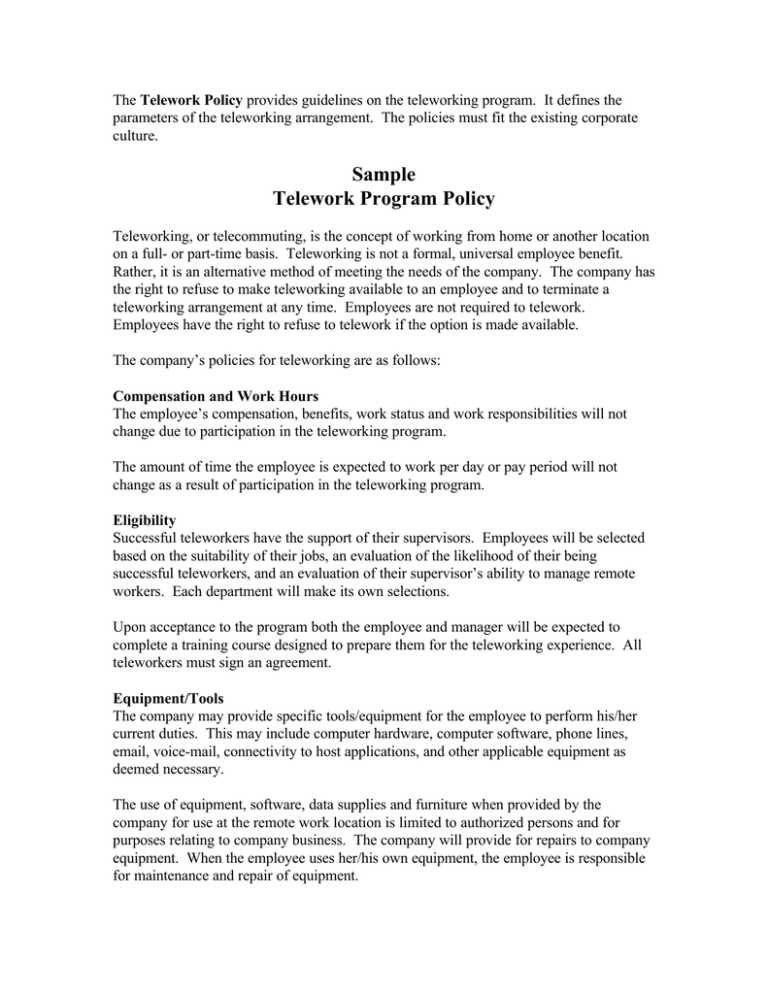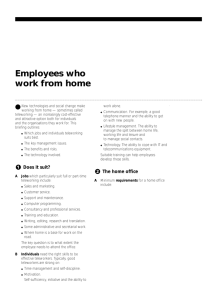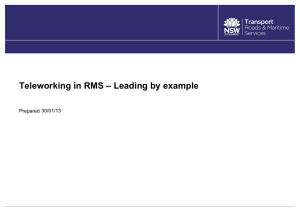Sample Telework Program Policy
advertisement

The Telework Policy provides guidelines on the teleworking program. It defines the parameters of the teleworking arrangement. The policies must fit the existing corporate culture. Sample Telework Program Policy Teleworking, or telecommuting, is the concept of working from home or another location on a full- or part-time basis. Teleworking is not a formal, universal employee benefit. Rather, it is an alternative method of meeting the needs of the company. The company has the right to refuse to make teleworking available to an employee and to terminate a teleworking arrangement at any time. Employees are not required to telework. Employees have the right to refuse to telework if the option is made available. The company’s policies for teleworking are as follows: Compensation and Work Hours The employee’s compensation, benefits, work status and work responsibilities will not change due to participation in the teleworking program. The amount of time the employee is expected to work per day or pay period will not change as a result of participation in the teleworking program. Eligibility Successful teleworkers have the support of their supervisors. Employees will be selected based on the suitability of their jobs, an evaluation of the likelihood of their being successful teleworkers, and an evaluation of their supervisor’s ability to manage remote workers. Each department will make its own selections. Upon acceptance to the program both the employee and manager will be expected to complete a training course designed to prepare them for the teleworking experience. All teleworkers must sign an agreement. Equipment/Tools The company may provide specific tools/equipment for the employee to perform his/her current duties. This may include computer hardware, computer software, phone lines, email, voice-mail, connectivity to host applications, and other applicable equipment as deemed necessary. The use of equipment, software, data supplies and furniture when provided by the company for use at the remote work location is limited to authorized persons and for purposes relating to company business. The company will provide for repairs to company equipment. When the employee uses her/his own equipment, the employee is responsible for maintenance and repair of equipment. A loaner laptop may be provided when available. Loaner computers will vary in performance and configuration. Loaners must be returned upon request. Workspace The employee shall designate a workspace within the remote work location for placement and installation of equipment to be used while teleworking. The employee shall maintain this workspace in a safe condition, free from hazards and other dangers to the employee and equipment. The company must approve the site chosen as the employee’s remote workspace. Employee is expected submit three photos of the home workspace to management prior to implementation. Any company materials taken home should be kept in the designated work area at home and not be made accessible to others. The company has the right to make on-site visits (with 48 hours advance notice) to the remote work location for purposes of determining that the site is safe and free from hazards, and to maintain, repair, inspect, or retrieve company-owned equipment, software, data or supplies. Office Supplies Office supplies will be provided by the company as needed. Out-of-pocket expenses for other supplies will not be reimbursed unless by prior approval of the employee’s manager. Worker’s Compensation During work hours and while performing work functions in the designated work area of the home, teleworkers are covered by worker’s compensation. Liability The employee’s home workspace will be considered an extension of the company’s workspace. Therefore, the company will continue to be liable for job-related accidents that occur in the employee’s home workspace during the employee’s working hours. The company will be liable for injuries or illnesses that occur during the employee’s agreed-upon work hours. The employee’s at-home work hours will conform to a schedule agreed upon by the employee and his or her supervisor. If such a schedule has not been agreed upon, the employee’s work hours will be assumed to be the same as before the employee began teleworking. The company assumes no liability for injuries occurring in the employee's home workspace outside the agreed-upon work hours. The company is not liable for loss, destruction, or injury that may occur in or to the employee’s home. This includes family members, visitors, or others that may become injured within or around the employee’s home. Dependent Care Teleworking is not a substitute for dependent care. Teleworkers will not be available during company core hours to provide dependent care. Income Tax It will be the employee’s responsibility to determine any income tax implications of maintaining a home office area. The company will not provide tax guidance nor will the company assume any additional tax liabilities. Employees are encouraged to consult with a qualified tax professional to discuss income tax implications. Communication Employees must be available by phone and email during core hours. All client interactions will be conducted on a client or company site. Participants will still be available for staff meetings, and other meetings deemed necessary by management. The company will pay work-related voice and data communication charges Evaluation The employee shall agree to participate in all studies, inquiries, reports and analyses relating to this program. The employee remains obligated to comply with all company rules, practices and instructions.



